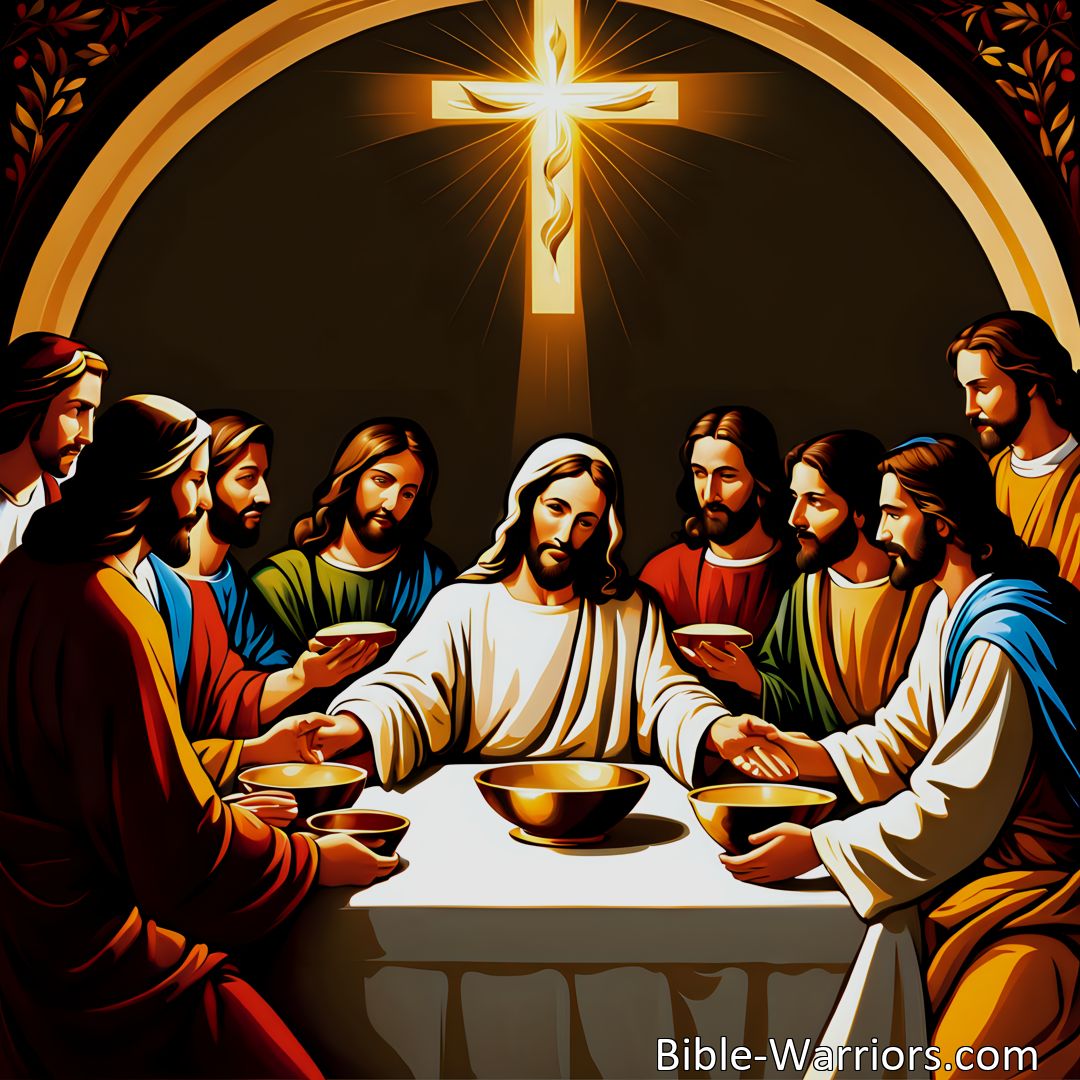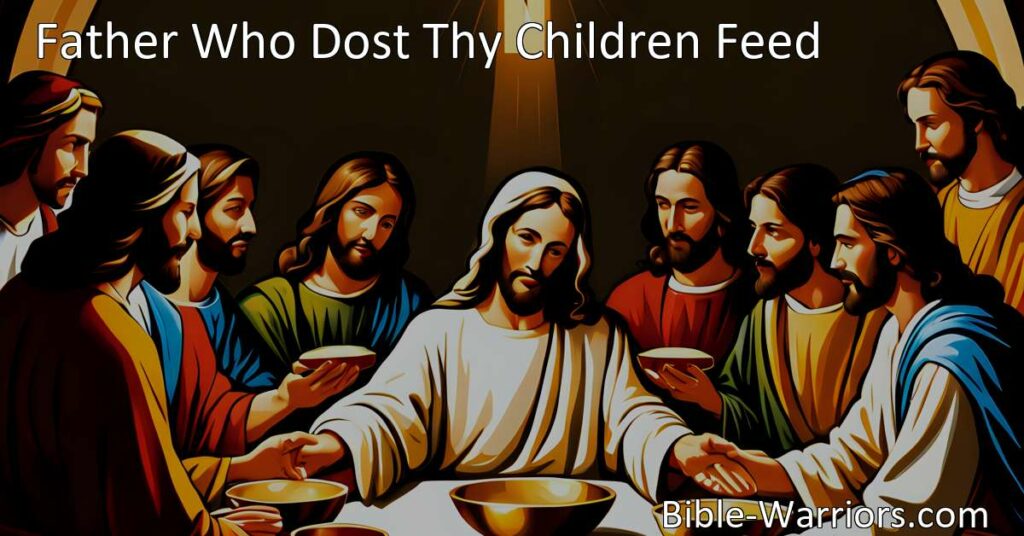Father Who Dost Thy Children Feed – Hymn Lyric
Father Who Dost Thy Children Feed: A Hymn of Gratitude and Communion In this hymn, we express gratitude to our Heavenly Father for providing for His children through the sacrament of communion. We explore the significance of communion, the role of Jesus Christ, and the presence of the Holy Spirit, angels, and saints. Through communion, we find nourishment for our souls and draw closer to God.
Table of Contents
Father Who Dost Thy Children Feed
Father, who dost Thy children feed
With manna rained from above;
Who dost the saving chalice give,
Filled by Thy hand in wondrous love:
We praise Thee for Thy mercies sent
To us in this great sacrament.
O Word made flesh, whom we adore,
The living Bread sent down from Heav’n,
Whose wondrous passion here shown forth
Is the great pledge of sin forgiven;
We praise Thee for Thy mercies sent
To us in this great sacrament.
O Holy Spirit, who dost reign
These earthly elements to bless,
Making the bread His flesh to be,
The wine His blood, as we confess;
We praise Thee for Thy mercies sent
To us in this great sacrament.
Ye holy angels, who, with us,
Around God’s altar lowly bow,
Adoring there the Crucified,
Whose precious death is pleaded now,
O praise Him for His mercies sent
To us in this great sacrament!
Ye blessed saints, enthroned on high,
Who once the paths of earth did tread,
Who reached in safety God’s abode,
As strengthened by this living bread;
O praise Him for His mercies sent
To us in this great sacrament!
O Holy Father, Holy Son,
And Holy Spirit, whom we love,
Guide, strengthen, save us here below,
And bring us to our home above,
To praise Thee for Thy mercies sent
To us in this great sacrament!
Meaning of Father Who Dost Thy Children Feed – Hymn Lyric
Father Who Dost Thy Children Feed: A Hymn of Gratitude and Communion
In this beautiful hymn, we are reminded of the abundant blessings and mercies that our Heavenly Father bestows upon us through the sacrament of communion. As we delve deeper into the meaning behind the verses, we will explore the significance of this sacrament, its ties to the life and sacrifice of Jesus Christ, and the roles of the Holy Spirit, angels, and saints in our worship and praise.
The hymn begins with a heartfelt expression of gratitude towards our Father in heaven, who lovingly provides for His children. Just as He rained manna from above to feed the Israelites in the wilderness, He now gives us the saving chalice, filled by His hand in wondrous love. The image of manna as spiritual nourishment emphasizes the importance of receiving sustenance from God and acknowledges His unwavering care for His children.
Next, we turn our focus to Jesus Christ, the Word made flesh, whom we adore. He is referred to as the living Bread sent down from Heaven, a direct reference to His miraculous feeding of the five thousand with just a few loaves of bread and fish. This act of multiplying food served as a physical demonstration of His divinity and marked the beginning of His ministry on earth. The hymn acknowledges His wondrous passion, which was shown forth through His death on the cross and serves as the ultimate pledge of sin forgiven. Through His sacrificial love, we are invited to partake in this great sacrament and find forgiveness and redemption.
We then shift our attention to the Holy Spirit, who plays a vital role in the sacrament of communion. The hymn recognizes the Holy Spirit’s presence during the consecration of the bread and wine, transforming these earthly elements into the body and blood of Christ. It is through the power of the Holy Spirit that we can truly commune with God and experience His divine presence in this sacred meal. We are encouraged to praise the Holy Spirit for His role in bringing us closer to God through the sacrament.
As we continue to sing this hymn, we invite the holy angels to join us in our worship and adoration. Just as these celestial beings bow before God’s altar in reverence and adore the Crucified, we too acknowledge the importance of Christ’s precious death as we partake in the sacrament. The hymn implores the angels to praise God for His mercies sent to us through communion, recognizing their role as witnesses to this sacred act.
Furthermore, the hymn includes a call to the blessed saints who have gone before us and now reside in the heavenly realms. These saints, who once trod the paths of earth, reached their ultimate destination God’s abode by being strengthened by this living bread. The saints serve as examples and sources of inspiration for us to persevere in our faith. Their presence reminds us that communion is not only a personal experience but also a communal act that unites the Church on earth and in heaven.
Finally, we conclude the hymn with an invocation to the Holy Trinity the Holy Father, Holy Son, and Holy Spirit. We seek their guidance, strength, and salvation as we journey through life. The hymn recognizes that communion is not only a momentary encounter with God, but it is also a means of shaping our lives and bringing us closer to our eternal home. We express our desire to praise God for the mercies He has sent us through this great sacrament and acknowledge that it is through communion that we find nourishment for our souls and draw nearer to the divine.
In summary, Father Who Dost Thy Children Feed is a hymn filled with gratitude and praise for the sacrament of communion. It beautifully encapsulates the transformative power of this sacred act, highlighting the roles of the Father, Son, Holy Spirit, angels, and saints in our worship and adoration. Through communion, we are reminded of God’s abundant mercies, forgiveness of sins, and the unity of believers across time and space. As we sing this hymn, let us not only give thanks for the physical nourishment provided in communion, but let us also seek spiritual nourishment and a deeper connection with our Heavenly Father.
I hope this hymn inspired image brings you hope and peace. Share it with someone who needs it today!



